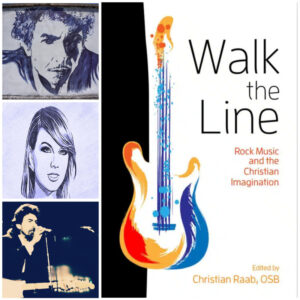BY KENNETH CRAYCRAFT
OSV Information
 A collage depicting the quilt of “Stroll the Line,” (courtesy New Town Press) and one of the most guide’s topics: Bob Dylan (Richard McAll, Eire, Pixabay), Taylor Swift (Pixabay) and George Harrison (Wikimedia Commons, cc by-sa 3.0/AI enhanced). The guide explores religious issues and Christian creativeness in in style tune and was once revealed in 2023 via New Town Press. (OSV Information picture/courtesy New Town Press/Pixabay/Wikimedia Commons)
A collage depicting the quilt of “Stroll the Line,” (courtesy New Town Press) and one of the most guide’s topics: Bob Dylan (Richard McAll, Eire, Pixabay), Taylor Swift (Pixabay) and George Harrison (Wikimedia Commons, cc by-sa 3.0/AI enhanced). The guide explores religious issues and Christian creativeness in in style tune and was once revealed in 2023 via New Town Press. (OSV Information picture/courtesy New Town Press/Pixabay/Wikimedia Commons)
“Stroll the Line: Rock Tune and the Christian Creativeness”
Father Christian Raab, OSB, ed.,
New Town Press, 2023
251 pages, $24.95
Editor’s be aware: Benedictine Father Christian Raab of St. Meinrad Archabbey serves as Parochial Vicar of St. Joseph Parish in Jasper.
I write this seven years to the day after the announcement that the Swedish Academy had awarded Bob Dylan the Nobel Prize in Literature. Sara Danius, then everlasting secretary of the academy, recommended Dylan “for having created new poetic expressions inside the nice American tune custom.” Danius when put next the perennial relevance of Dylan to such immortal poets as Homer and Sappho. Like those historical Greeks, she famous, “Bob Dylan writes poetry for the ear … poetic texts that have been intended to be listened to, that have been intended to be carried out.” After listening to the announcement, novelist Salman Rushdie seen, “Dylan is the intense heir of the bardic custom.”
It was once exactly the bardic, aural qualities of historical Greek poetry that brought about Plato to place tune on the heart of his philosophy of the training of a just right citizen. He mentioned, “Rhythm and unity permeate the interior a part of the soul, affecting it maximum strongly and bringing it grace, in order that if any person is correctly trained in tune and poetry, it makes him swish. But when now not, the other.” Thus, musical training can’t be separated from training in such virtues as “moderation, braveness, frankness, high-mindedness,” in addition to their reverse vices.
The typical trope about rock tune, after all, is that it contributes to these reverse vices. “The satan’s tune,” rock is frequently related to licentious intercourse and leisure medicine, now not the classical virtues. Thus, rock-n-roll is frequently pushed aside as having no redeeming qualities. Within the splendidly eclectic and persistently insightful new guide, “Stroll the Line: Rock Tune and the Christian Creativeness,” editor Benedictine Father Christian Raab and his 9 co-contributors problem that simplistic mindset.
To verify the very important goodness of introduction – and God as its creator – implies that anywhere fact is expressed, this can be a participation within the everlasting thoughts of God, despite the fact that its expression isn’t expressly Christian. As “Lumen Gentium” places it, “many components of sanctification and of fact are discovered out of doors” the visual construction of the Church. Or, as Elizabeth Scalia notes in her foreword to “Stroll the Line,” even not going varieties of tune is also “techniques of prayer” that make a salutary contribution to the improvement of the human soul. That is true even if tune displays religious angst, loneliness or doubt, that are unique stories of non secular expansion and construction.
Thus, Joseph Quinn Raab’s bankruptcy on George Harrison supplies a Christian theological interpretation of Harrison’s seek for the sunshine of fact and salvation in non-Christian traditions. Quite than to difficult to understand the substantive variations in the ones traditions, Raab makes use of Harrison’s tune to focus on their unique notions of God and introduction, whilst highlighting the human quest for enlightenment.
This can be a helpful distinction with Keith Lemma’s bankruptcy at the tune of U2. Bono and U2 are essentially the most conspicuous Christian musicians mentioned in “Stroll the Line.” However Lemma does now not permit their ambiguous connection to Christian religion move unchallenged. As an alternative, he issues out the stress within the Christian religiosity in their posture and the general public positions they have got taken on vital ethical problems. Quite than denounce the band, then again, Lemma demanding situations U2 to include a extra constant and unique expression of Christian liberation.
Robert E. Alvis, however, makes a compelling case that Bob Dylan, the authenticity of whose well-known past due Nineteen Seventies conversion to Christianity is perennially puzzled, has returned to a deep, if now not straight forward, Christian religion. Alvis particularly highlights Dylan’s most up-to-date album, “Tough and Rowdy Techniques,” in creating a compelling argument. I accept as true with Alvis that the album displays “Dylan’s mature spiritual outlook,” expressing “values of inclusion, cohesion, and catholicity … whilst adhering to conventional Christian fact claims.”
After all, a brief evaluate can handiest scratch the outside of this persistently exceptional guide. Each and every of the members be offering authentic, contemporary Christian complaint of recent tune. From such disparate topics as Kurt Vile and Flannery O’Connor (in a bankruptcy via William C. Hackett) to Taylor Swift and Benedict XVI (Brian Pedraza), the authors of those essays have made a treasured contribution to an appreciation of the connection of Christian religion to rock-in-roll.
– – –
Kenneth Craycraft is an affiliate professor of ethical theology at Mount St. Mary’s Seminary and Faculty of Theology in Cincinnati.


